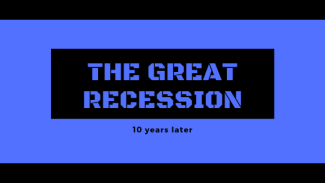
Revisiting the Great Recession, Part 1
By Gary Silverman, CFP®
It’s been 10 years since the Great Recession. From an investment market standpoint, it began in late 2007 and didn’t end until early 2009. The stock market fell off the cliff in September of 2008.
The seeds of the crisis began many years prior (arguments over who’s at fault continue). The repercussions didn’t end in 2009…just ask anyone who went through months or years of unemployment or those who came out of college into a world with no work for them. Harm from the Crisis will continue for decades to come and, for some, a lifetime.
I’m going to spend some time sharing my thoughts and observations about that time and the events surrounding it. A lot of it will be my opinion mixed with a bit of conjecture. Much of it will be oversimplified—indulge me. You don’t have to agree…I’d rather you think and then research for yourself.
A good place to start is with what caused the whole thing. With something as big as this it is never one thing. However, two things stand out. First, the government wanted to allow folks who had less money and income to own houses. It was seen as unfair that only the wealthier segments of society got to partake of this part of the American Dream.
Of course, people of lesser means have always been in the mix of home ownership, but to a lesser extent. This makes perfect economic sense. Having less assets and less income means that it is extraordinarily hard to save up enough money to buy a house for cash. And that same combination makes you less of a prospect to potential lenders. Even if you could convince a lender that you are a good risk, you will be a greater risk than those with more assets and more income. To compensate you’ll end up paying a higher interest rate making it even harder to buy a home.
That this makes economic sense doesn’t matter. It just doesn’t seem fair to a number of people. That is not necessarily a wrong viewpoint. The same economics would dictate that you should receive less or inferior medical care and education. And while both of those things do indeed happen, a sizeable number of Americans think that those playing fields should be leveled. All of this is still being debated and the current reality is not level. Nevertheless when politicians hear from enough constituents (the folks who give them their jobs) they like to “do something” about the perceived injustices.
Thus rules and regulations were put into place to tilt the playing field a bit more level and help out those of lower economic means.
That did not cause the financial crisis.
But without it, the next step would have not have been taken. You see, business likes to make money. Even when businesses are forced to do something they didn’t want to do, they’ll spend quite a lot of time figuring out how to make money from it.
We’ll discuss that next time.
Gary Silverman, CFP® is the founder of Personal Money Planning, LLC, a Wichita Falls retirement planning and investment management firm and author of Real World Investing

